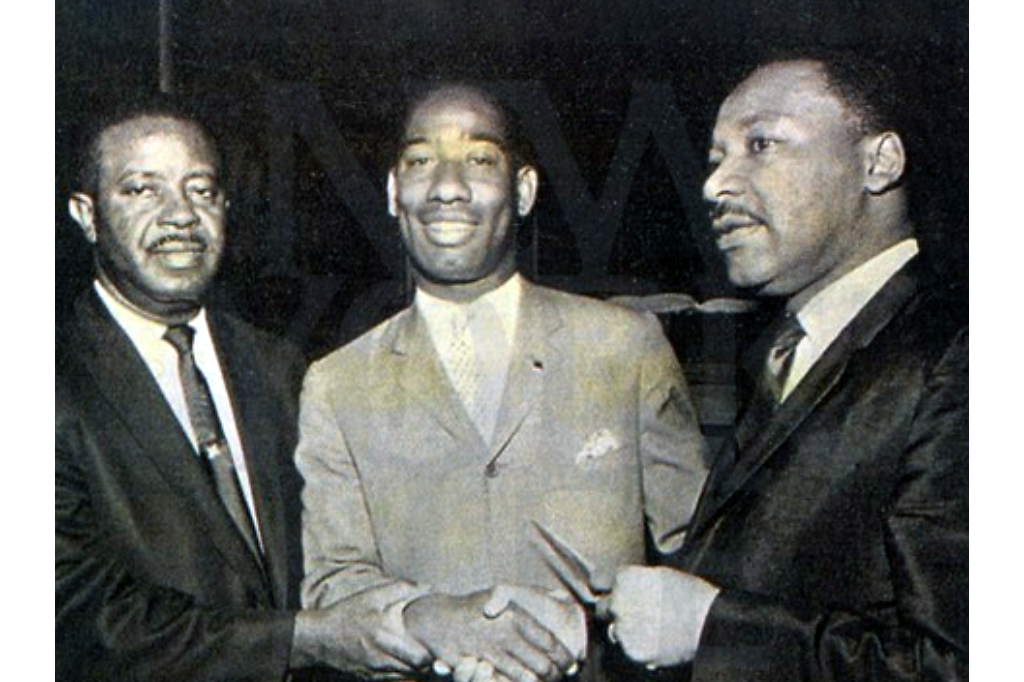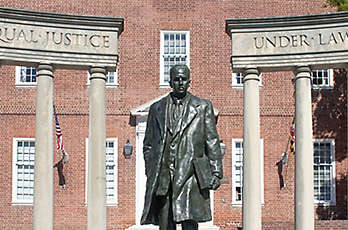History
Shared economic goals: New York Life's Cirilo McSween and Dr. Martin Luther King Jr.
New York Life | January 17, 2025

Much of Dr. Martin Luther King Jr.’s work centered on the basic right to support one’s family. In fact, though the “I Have a Dream” speech delivered at the March on Washington in 1963 is remembered for King’s dream that individuals be judged by character rather than skin color, it is as much about economic self-determination for the Black community.
Cirilo McSween, a trailblazing agent who broke barriers as New York Life's first Black agent, worked closely with King in the Civil Rights Movement and in creating economic opportunity for Black Americans. The two became friends, with McSween ultimately serving as one of King’s pallbearers in 1968.
“We are extremely proud of Cirilo McSween for opening doors at New York Life for other Black agents, his commitment to providing financial security to the Black community, and his work with Dr. King and the Southern Christian Leadership Conference (SCLC). We will be building on those legacies for decades to come,” said Eric Jackson, head of Diversity, Equity & Inclusion for New York Life's Agency department.
Self-determined
Before meeting King, McSween, a former Olympic athlete from Panama, quickly rose to success after joining New York Life in 1957, earning a spot in the Million Dollar Round Table (MDRT). He was the first Black agent to do so and remained a qualifying member each year of his career. Providing protection to families and helping them develop legacy wealth became a jumping off point for him. Always standing up for his own rights and others’, McSween found a voice in the 1960s alongside King, who appreciated his financial acumen and ability to raise funds, as part of the SCLC.
McSween earned a bachelor’s degree from the University of Illinois in economics while also learning and mastering English, his second language. He later journeyed from Chicago to New York City for a position at the New York Life home office and then spent the next 28 years as a top producer at the company.
McSween’s life was a case study of thriving in challenging circumstances. His own experience and his encounters with others struggling for civil and economic justice drove McSween to develop other business opportunities. He was on the board of directors of Black-owned Independence Bank in Chicago, owned 11 McDonald’s franchises, and served on the board of the Black McDonald’s Owners Association. He also mentored Black entrepreneurs and led fundraising efforts for various civil rights organizations. King was so impressed by McSween’s quick mind that he recommended he join the board of directors of the SCLC, eventually becoming its treasurer.
In a tribute to McSween, civil rights activist Rev. Gary Massoni said, “[Cirilo] has a great capacity to listen to ideas, absorb them, challenge them, modify them and then reach conclusions and recommendations that would work. He used not only his money and his position, but more importantly his mind and his values and his commitments to make justice possible. This is what makes Cirilo great to me.”
Leadership legacy
Author Martin L. Deppe wrote: “[Cirilo] once said that he modeled his life after Dr. King’s, and [he] was a model of dignity, determination, and fair play in economic leadership circles of Chicago.”
That description reflects many New York Life agents, who protect families and help build generational wealth. As the first Black agent at New York Life, McSween became a model for others to follow. He inspired many who came after him and in 2002, New York Life commemorated McSween’s dedication to lifting people of color by establishing the Cirilo McSween Scholarship. The scholarship carries on McSween’s legacy, awarding $1,092,000 to recipients since its creation.
The late Gus Bowers joined New York Life in 1968. Bowers entered a career with growth potential that was a direct result of McSween’s efforts. “I didn’t see much of Cirilo then because he was so occupied with the civil rights movement,” Bowers said in a 2018 interview in honor of his own 50th anniversary. “But there was a network of Black agents and managers I could call on,” he said. McSween’s efforts were expanding economic opportunities for individual agents and their communities.
King’s economic message
A visionary leader who believed in collective success, McSween wanted everyone to win, so it’s not surprising that he was attracted to King and other leaders in the civil rights movement. A key part of King’s work was ensuring that people of color had the same opportunities to earn a living and create a community. The “I have a Dream” speech aligned with the economic vision of McSween and his colleagues.
In the nearly 17-minute speech at the March on Washington for Jobs and Freedom, King addressed economic inequality. One hundred years after the Emancipation Proclamation, Black Americans remained constrained by discrimination. King’s vision and McSween’s work sought to fulfill the American promise of opportunity, ensuring that no community is left behind. They urged action over despair.
“But we refuse to believe that the bank of justice is bankrupt. We refuse to believe that there are insufficient funds in the great vaults of opportunity of this nation. And so, we've come to cash this check, a check that will give us upon demand the riches of freedom and the security of justice,” King said.
This was not asking for a handout, but rather for access to opportunity. McSween had a similar focus — his work with New York Life created opportunity for other people of color and consequently provided protection and financial stability for their clients.
McSween’s passing on the day after Barack Obama’s historic election as the first Black President marked the end of one era and the beginning of another. His trailblazing legacy, defined by breaking barriers and empowering others, continues to inspire new generations to dream boldly and create opportunities that uplift communities for years to come.
This article was originally published February 23, 2021.
RELATED CONTENT
Go back to our newsroom to read more stories.
Media contact
Kevin Maher
New York Life Insurance Company
(212) 576-7937
Kevin_B_Maher@newyorklife.com

